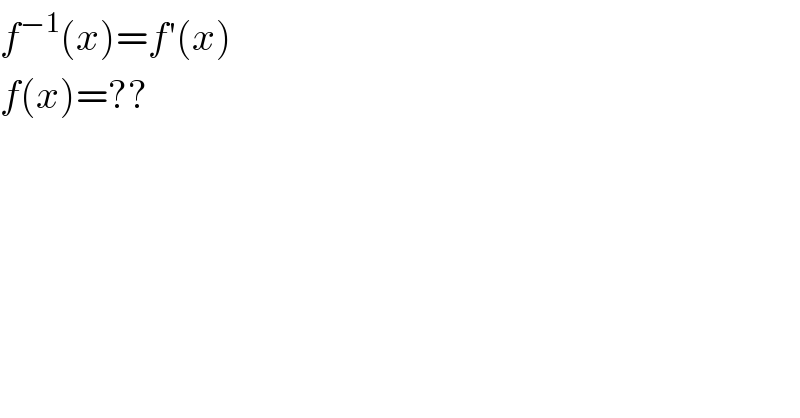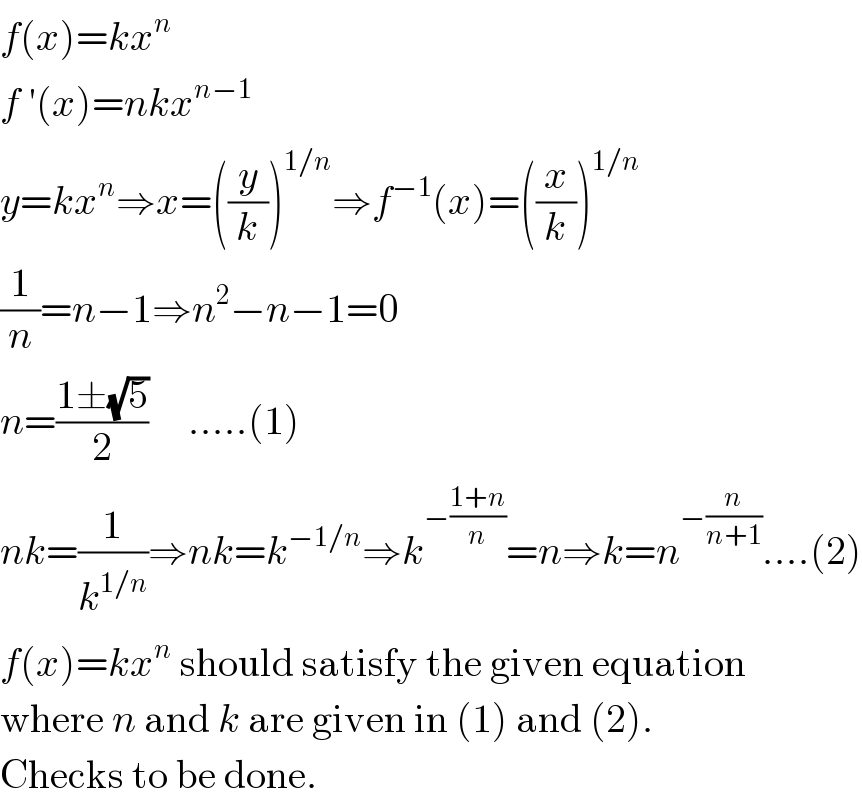
Question Number 2075 by 123456 last updated on 01/Nov/15

$${f}^{−\mathrm{1}} \left({x}\right)={f}'\left({x}\right) \\ $$$${f}\left({x}\right)=?? \\ $$
Commented by Yozzi last updated on 01/Nov/15
![1=f(x)f^′ (x) ⇒∫1dx=∫f(x)f^′ (x)dx x+c=(1/2)[f(x)]^2 2x+c=[f(x)]^2 f(x)=±(√(2x+c)) e.g, c=0,f(x)>0⇒f(x)=(√(2x)) ∴f^′ (x)=(√2)×(1/(2(√x))) f^′ (x)=(1/(√(2x)))=(1/(f(x)))](Q2077.png)
$$\mathrm{1}={f}\left({x}\right){f}^{'} \left({x}\right) \\ $$$$\Rightarrow\int\mathrm{1}{dx}=\int{f}\left({x}\right){f}^{'} \left({x}\right){dx} \\ $$$${x}+{c}=\frac{\mathrm{1}}{\mathrm{2}}\left[{f}\left({x}\right)\right]^{\mathrm{2}} \\ $$$$\mathrm{2}{x}+{c}=\left[{f}\left({x}\right)\right]^{\mathrm{2}} \\ $$$${f}\left({x}\right)=\pm\sqrt{\mathrm{2}{x}+{c}} \\ $$$${e}.{g},\:{c}=\mathrm{0},{f}\left({x}\right)>\mathrm{0}\Rightarrow{f}\left({x}\right)=\sqrt{\mathrm{2}{x}} \\ $$$$\therefore{f}^{'} \left({x}\right)=\sqrt{\mathrm{2}}×\frac{\mathrm{1}}{\mathrm{2}\sqrt{{x}}} \\ $$$${f}^{'} \left({x}\right)=\frac{\mathrm{1}}{\sqrt{\mathrm{2}{x}}}=\frac{\mathrm{1}}{{f}\left({x}\right)} \\ $$
Commented by prakash jain last updated on 01/Nov/15

$${f}^{−\mathrm{1}} \left({x}\right)\:\mathrm{is}\:\mathrm{for}\:\mathrm{inverse}\:\mathrm{of}\:{f}? \\ $$
Commented by 123456 last updated on 01/Nov/15

$$\mathrm{yes},\:\mathrm{inverse}\:\mathrm{function} \\ $$
Commented by Rasheed Soomro last updated on 02/Nov/15
![On the comment of Yozzi Why f(x)>0 [in 6^(th) line] Is f(x)≠0 not sufficient? ∴ f(x)=±(√(2x)) [Not only +(√(2x)) ]](Q2094.png)
$${On}\:{the}\:{comment}\:{of}\:{Yozzi} \\ $$$${Why}\:{f}\left({x}\right)>\mathrm{0}\:\:\:\left[{in}\:\mathrm{6}^{{th}} \:{line}\right] \\ $$$${Is}\:\:{f}\left({x}\right)\neq\mathrm{0}\:\:{not}\:{sufficient}? \\ $$$$\therefore\:{f}\left({x}\right)=\pm\sqrt{\mathrm{2}{x}}\:\:\:\:\:\:\left[{Not}\:{only}\:+\sqrt{\mathrm{2}{x}}\:\:\right] \\ $$
Commented by Yozzi last updated on 02/Nov/15

$${I}\:{was}\:{giving}\:{an}\:{example}. \\ $$$${example}\equiv{e}.{g}. \\ $$$${The}\:{interpretation}\:{of}\:{the}\:{question} \\ $$$${was}\:{incorrect}. \\ $$
Answered by prakash jain last updated on 01/Nov/15

$${f}\left({x}\right)={kx}^{{n}} \\ $$$${f}\:'\left({x}\right)={nkx}^{{n}−\mathrm{1}} \\ $$$${y}={kx}^{{n}} \Rightarrow{x}=\left(\frac{{y}}{{k}}\right)^{\mathrm{1}/{n}} \Rightarrow{f}^{−\mathrm{1}} \left({x}\right)=\left(\frac{{x}}{{k}}\right)^{\mathrm{1}/{n}} \\ $$$$\frac{\mathrm{1}}{{n}}={n}−\mathrm{1}\Rightarrow{n}^{\mathrm{2}} −{n}−\mathrm{1}=\mathrm{0} \\ $$$${n}=\frac{\mathrm{1}\pm\sqrt{\mathrm{5}}}{\mathrm{2}}\:\:\:\:\:.....\left(\mathrm{1}\right) \\ $$$${nk}=\frac{\mathrm{1}}{{k}^{\mathrm{1}/{n}} }\Rightarrow{nk}={k}^{−\mathrm{1}/{n}} \Rightarrow{k}^{−\frac{\mathrm{1}+{n}}{{n}}} ={n}\Rightarrow{k}={n}^{−\frac{{n}}{{n}+\mathrm{1}}} ....\left(\mathrm{2}\right) \\ $$$${f}\left({x}\right)={kx}^{{n}} \:\mathrm{should}\:\mathrm{satisfy}\:\mathrm{the}\:\mathrm{given}\:\mathrm{equation} \\ $$$$\mathrm{where}\:{n}\:\mathrm{and}\:{k}\:\mathrm{are}\:\mathrm{given}\:\mathrm{in}\:\left(\mathrm{1}\right)\:\mathrm{and}\:\left(\mathrm{2}\right). \\ $$$$\mathrm{Checks}\:\mathrm{to}\:\mathrm{be}\:\mathrm{done}. \\ $$
